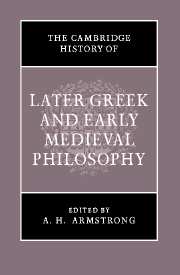Book contents
- Frontmatter
- Chapter 1 Introductory
- Part 1 GREEK PHILOSOPHY FROM PLATO TO PLOTINUS
- Part II PHILO AND THE BEGINNINGS OF CHRISTIAN THOUGHT
- Part III PLOTINUS
- Part IV THE LATER NEOPLATONISTS
- Part V MARIUS VICTORINUS AND AUGUSTINE
- Chapter 20 Marius Victorinus
- Chapter 21 Augustine. Biographical introduction: Christianity and philosophy
- Chapter 22 Augustine. Man: body and soul
- Chapter 23 Augustine. Reason and illumination
- Chapter 24 Augustine. Sense and imagination
- Chapter 25 Augustine. Human action: will and virtue
- Chapter 26 Augustine. God and nature
- Chapter 27 Augustine. Man in history and society
- Part VI THE GREEK CHRISTIAN PLATONIST TRADITION FROM THE CAPPADOCIANS TO MAXIMUS AND ERIUGENA
- Part VII WESTERN CHRISTIAN THOUGHT FROM BOETHIUS TO ANSELM
- Part VIII EARLY ISLAMIC PHILOSOPHY
- Select Bibliography
- Additional Notes and Bibliography
- Index of ancient and medieval works referred to in the text
- General Index
- Index of Greek terms
- References
Chapter 22 - Augustine. Man: body and soul
from Part V - MARIUS VICTORINUS AND AUGUSTINE
Published online by Cambridge University Press: 28 March 2008
- Frontmatter
- Chapter 1 Introductory
- Part 1 GREEK PHILOSOPHY FROM PLATO TO PLOTINUS
- Part II PHILO AND THE BEGINNINGS OF CHRISTIAN THOUGHT
- Part III PLOTINUS
- Part IV THE LATER NEOPLATONISTS
- Part V MARIUS VICTORINUS AND AUGUSTINE
- Chapter 20 Marius Victorinus
- Chapter 21 Augustine. Biographical introduction: Christianity and philosophy
- Chapter 22 Augustine. Man: body and soul
- Chapter 23 Augustine. Reason and illumination
- Chapter 24 Augustine. Sense and imagination
- Chapter 25 Augustine. Human action: will and virtue
- Chapter 26 Augustine. God and nature
- Chapter 27 Augustine. Man in history and society
- Part VI THE GREEK CHRISTIAN PLATONIST TRADITION FROM THE CAPPADOCIANS TO MAXIMUS AND ERIUGENA
- Part VII WESTERN CHRISTIAN THOUGHT FROM BOETHIUS TO ANSELM
- Part VIII EARLY ISLAMIC PHILOSOPHY
- Select Bibliography
- Additional Notes and Bibliography
- Index of ancient and medieval works referred to in the text
- General Index
- Index of Greek terms
- References
Summary
Augustine's views concerning the nature of man and of his place in the universe inevitably underwent profound transformations during his intellectual journey from Manichaean, through Neoplatonic, to Christian teaching. The three outlooks differ profoundly in their estimate of man. In Manichaean doctrine, man is a being torn in two, or two beings, just as the world itself is divided or thought of as two worlds, a world of darkness and a world of light. According to its cosmogonic myth, these are created by different creators, ruled by their own rulers, and are perpetually at war. Man is an episode in the inter-cosmic warfare: he is the product of an emission from the kingdom of light into that of darkness. The myth pictures him as the emissary of light devoured by the darkness, kept imprisoned by it and prevented from returning to his home. Man is object, stage and agent of this cosmic struggle. The cosmic forces are mobilized to prevent or to assist his return to his spiritual home; he is himself a composite of the two worlds which are at war within as well as around him; and he has some power to co-operate with the forces of darkness or to resist. In this last capacity man is not quite a passive spectator of the conflict: he is called to resist the entanglement with evil, to repudiate the body, its main agency. Rejection of and liberation from the body are therefore a vital part of the Manichaean doctrine of salvation: they belong to a realm essentially evil, and are foreign to man's inmost nature, serving as the prison of his real self.
- Type
- Chapter
- Information
- Publisher: Cambridge University PressPrint publication year: 1967



